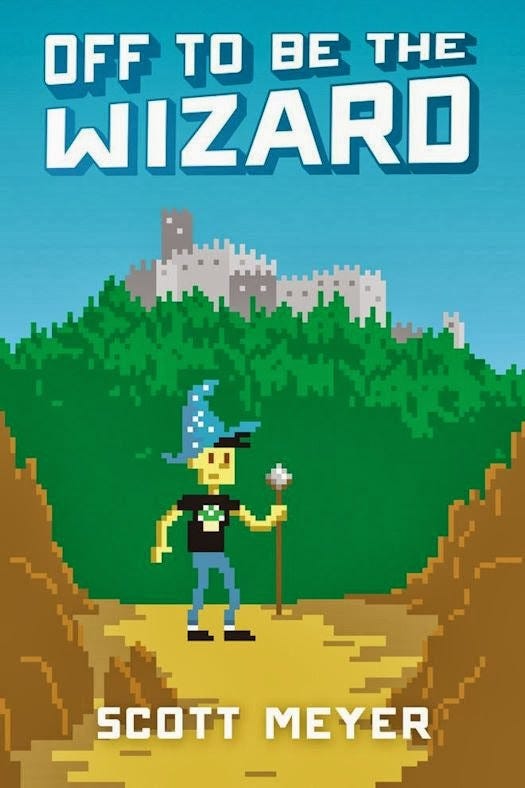The Venn Diagram of computer hackers and fantasy geeks has a LOT of overlap, so here's a story about a guy who uses his hacking skills to become an actual wizard in the Middle Ages, almost by accident. The thing is, he's definitely not the first one to figure out how...
You have probably seen some of Scott Meyer's webtoons over at www.basicinstructions.net. He brings that same level of dry humor and quick wit to his debut novel series in OFF TO BE THE WIZARD. After a hiatus of about seven years, he started doing new cartoons on the site again.
The story
What's that Japanese word? Isekai? It's used to describe "portal fantasy" novels where the protagonist jumps from our world into a different one. OFF TO BE THE WIZARD kind of feels like that, though it's more like a time travel book. I really liked the mechanism used by Martin to jump from the 21st Century to the Middle Ages. Meyer introduces it quickly and neatly, so there isn't a ton of exposition that explains how the whole concept works.
It starts out as a "nerd walks around a setting he only ever daydreamed about" kind of book, only to develop into a "wow, I bet he never predicted THIS problem or THIS problem or THIS problem..." kind of book. From the get-go we learn that Martin is a hacker, he pokes around in corporate databases, and he loves fantasy novels. When he stumbles across a parcel of data that happens to have his name in it--along with numbers like his height, weight, and SSN--he modifies some of the entry, only to realize that doing so literally changes the world around him.
Martin does some other experimentation with the data parcel, called the Respository, only to end up bringing the Feds down on him, and soon he has to hide. I liked how Meyer found a way to get Martin to hide in the past without making it feel forced. I mean, the premise of this book is a hacker becoming a wizard, right? That's really where we want to go and have some fun, and he gets us there without dragging it out or contriving anything. It's good, quick, tidy writing.
The characters
Martin is our focal character, but we're soon introduced to a bunch of other time-traveling hackers who've done the same thing he's doing. The first is Phillip, who defeats Martin in "magical" combat, then takes him under his wing to show him the rules of the time and place.
There are other time travelers posing as wizards, nearly two dozen of them, and they've put rules in place to prevent their fellow "magicians" from screwing up the timeline while they play around in the 12th Century. The important one is a wizard named Jimmy, who isn't afraid to buck the rules and tweak things that he shouldn't mess with.
It's Jimmy's actions that lead to the main conflict of the story, which are worth the price of discovery for the reader. It's a more interesting conflict than I would have predicted when I first picked up the book.
The world
Our world, with computer code-based magic. The "wizards" from the future debate whether the 12th Century in which they find themselves is even real, as opposed to being a digital construct where no action can have any moral consequence.
As mentioned above, this is where the divide between the main wizards and Jimmy comes into play. Big philosophical and moral questions have to be asked, as Jimmy starts messing with the lives of innocent people to create his own fantasy world.
The politics
Joyously, deliciously, there really aren't any. The story asks a moral question, but doesn't bother with any of our real-world politics. I really loved that.
Content warning
Literally nothing! That was another surprise, and a welcome one. All of the focal characters are in their twenties and thirties, and yet this is a PG-rated story. No language, sex, or graphic violence. I quite liked this piece of sci-fi/fantasy for that reason.
Who is it for?
Due to its lightheartedness, clean content, and actual moral substance, I'd recommend this to anyone. Young readers could sink their teeth into it for a challenge above their grade level, and the seasoned sci-fi consumer can be entertained by its easy accessibility and surprise factor.
Why read it?
Meyer has created a fun world to play in, a bit of lighthearted escapism that isn't afraid to have a big moral conflict play out in the third act. Once I finished the first book, it didn't surprise me to learn he'd written five more after it; there's obviously a hunger out there for a book of this particular profile, and I'm excited to read the next one.




